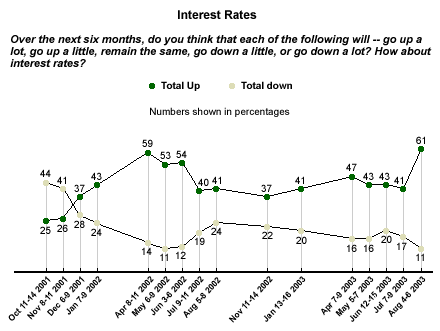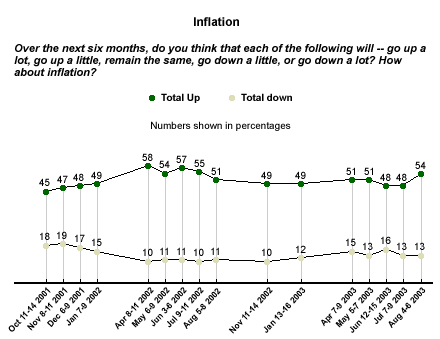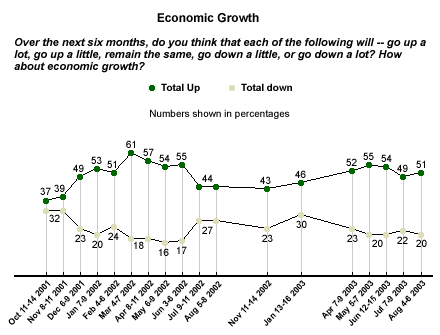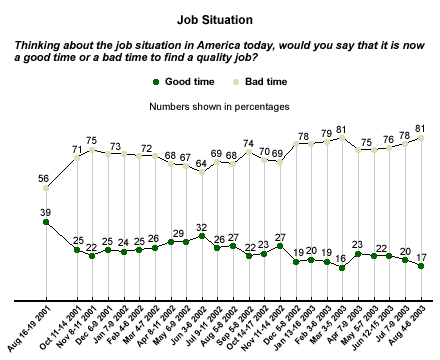Expectations in the marketplace are that the Federal Reserve's Federal Open Market Committee (FOMC) will leave interest rates unchanged when it meets today. Signs of a modestly improving economy will keep the Fed from lowering rates, while fears of deflation will forestall an increase.
In sharp contrast to the analysts' expectations for the FOMC meeting, an Aug. 4-6 Gallup Poll* shows 6 in 10 consumers currently expect interest rates to go up over the next six months -- a major increase from a month ago. At the same time, more than half of Americans also expect economic growth and inflation to increase in the months ahead, yet overall consumer confidence remains at comparatively low levels, exhibiting no upward momentum.
Thus, consumer perceptions of the current economy lead to some interesting questions: Why do consumers fear inflation and higher interest rates later this year? And why isn't consumer optimism gaining momentum if the majority of consumers expect the economy to grow during the last half of this year?
Consumers Say Interest Rates Will Go Up
Last week, 61% of the public told Gallup it expects interest rates to go up over the next six months -- a 20-percentage-point increase from Gallup's July 7-9 poll (41%). This is the largest percentage of consumers expecting higher interest rates since Gallup began routinely monitoring consumer rate expectations in October 2001.

Consumers Also Say Inflation Will Go Up
Fifty-four percent of consumers expect inflation to go up over the next six months -- an increase of six percentage points from July and June. Although the increase in the public's inflationary expectations was much smaller than the increase in its interest rate expectations, this is the largest percentage of consumers expecting higher inflation since April 2002 (58%).

And, Consumers Say Economic Growth Will Go Up
Half of Americans expect economic growth to increase over the next six months -- up only two percentage points since July (49%) and down three percentage points since June (54%). The percentage of consumers expecting economic growth to increase remains far below the 61% who held this expectation in March 2002.

Why Do Consumers Expect Higher Rates?
That most Americans expect interest rates to increase in the months ahead is not surprising. The economy is estimated to have grown by 2.4% in the second quarter and is widely expected to grow more rapidly during the remainder of the year. In the past, economic growth has usually produced higher interest rates.
Consumers also see prices increasing. For example, gas prices are substantially higher than they were a year ago and have been increasing during recent weeks. In the past, inflation has frequently led to higher interest rates.
Most importantly, during recent weeks mortgage rates have increased to near their highest levels in a year. Auto dealers, realtors, mortgage bankers, and financial advisers are telling consumers that they should take advantage of today's low rates because they are likely to keep increasing. To many consumers, these increases in long-term interest rates are more important right now than whatever the FOMC decides to do with short-term rates later today.
Further, while policy-makers think in terms of increased productivity and a lack of pricing power as threatening deflation, most consumers see no evidence of such pressures in their daily lives.
Why Isn't Consumer Confidence Gaining Momentum?
According to the August poll, 25% of Americans rate current economic conditions "excellent or good" while 23% rate them "poor." This is better than in July (24% excellent or good, 26% poor), but about the same as in June (26% excellent or good, 25% poor).
Similarly, 44% of consumers currently think economic conditions are "getting better." About the same percentage felt this way in July (43%) and June (45%). Combined, these two measures suggest that consumer confidence not only remains at relatively low levels, but also has no upward momentum.
A major reason consumer confidence is not increasing, even as the economy grows, may be the apparent weakening of the traditional economic relationship between economic growth and jobs. Eighty-one percent of Americans think now is a bad time to find a quality job, which ties March 2003 for the highest percentage of Americans saying it is a bad time to find a job since Gallup began regularly asking this question in August 2001.
Economic policy-makers, including those in the FOMC, recognize that many traditional economic relationships no longer hold true. But much of the public does not, and fewer still understand the full implications. Looking ahead, the truly interesting question becomes what the political and economic fallout will be when the relationship between jobs and economic growth becomes the subject of debate during next year's elections.

*Results are based on telephone interviews with 1,003 national adults, aged 18 and older, conducted Aug. 4-6, 2003. For results based on the total sample of national adults, one can say with 95% confidence that the margin of sampling error is ±3 percentage points.
